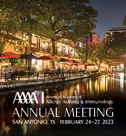


result
AAAAI Researcher Receives the First NIH Funding for FPIES
AAAAI Researcher Receives the First NIH Funding for FPIES
After years of perseverance, the hard work of AAAAI Board of Directors member Anna H. Nowak-Wegrzyn, MD, PhD, FAAAAI, and her colleague Cecilia Berin, PhD, paid off. The National Institutes of Health (NIH) awarded them a research grant of 2.5 million dollars to study the immunology of Food Protein-Induced Enterocolitis Syndrome (FPIES) – the first time the NIH has awarded funds for this condition.

AAAAI Board of Directors member Anna H. Nowak-Wegrzyn, MD, PhD, FAAAAI
“It feels amazing to be awarded this funding,” said Dr. Nowak-Wegrzyn. “It’s long overdue to have sponsored research for FPIES.”
Dr. Nowak-Wegrzyn has been interested in FPIES for 25 years. Back then, it was thought to be an uncommon condition. Over the past two decades, however, healthcare professionals have started seeing an increasing number of patients. “It might be better diagnosis, increased awareness – or it could be increased prevalence. We just don’t know,” she added. “We estimate about 0.5% of children and 0.2% of adults have FPIES in the U.S.”
FPIES manifests as an allergic emergency, with delayed projectile, repetitive vomiting and lethargy that might lead to dehydration and hypovolemic shock. Its unusual symptoms also make it more difficult to identify, and it may be dismissed as food poisoning or an infection.
Dr. Nowak-Wegrzyn and Dr. Berin will explore FPIES oral food challenges, examining changes in participants’ blood immune parameters following the challenge. They hope this research will lead to a better diagnostic test and better treatment options by deciphering the mechanisms of FPIES reactions. “We can’t treat it if we don’t understand the mechanism of reaction,” Dr. Nowak-Wegrzyn said. “This funding will help us better understand the pathophysiology – what happens during a reaction. Right now we can describe the phenotype, but not the mediators of the reaction.”
Momentum had to be built to demonstrate the need for more funding. Until now, research has been mostly supported by institutions, private donors and lay patient organizations such as International FPIES Association. As the body of research has grown, researchers have been better able to present the case for NIH funding. “Everything finally fell into place that allowed us to make the argument that FPIES is an important area of study. It’s just not as rare as we once thought, and many patients with FPIES go on to develop other allergic diseases.”
Dr. Nowak-Wegrzyn and Dr. Berin can’t wait to get started. “FPIES finally has a home,” Dr. Nowak-Wegrzyn said. “I’m incredibly honored to have received this NIH funding so my colleague and I can provide more answers about this misunderstood condition.”





